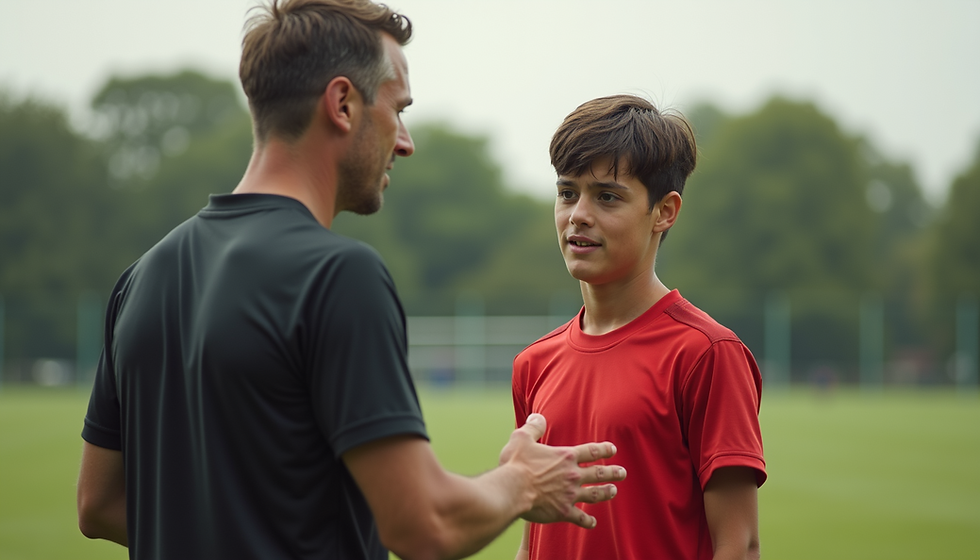How to Be a Good Supervisor in Sport Psychology: Your Complete Guide
- Dr Paul McCarthy

- Aug 25, 2025
- 7 min read

The field of sport psychology continues to grow, creating increased demand for qualified supervisors who can guide the next generation of practitioners. Whether you’re reviewing current sport psychology job openings or already established in your career, understanding effective supervision practices is crucial for professional success and client welfare.
Supervision in sport psychology serves a dual purpose: protecting client wellbeing while fostering professional development in supervisees. This comprehensive guide will walk you through the essential components of becoming an exceptional supervisor in this specialized field.
Understanding Sport Psychology Job Openings and Supervision Roles
When examining sport psychology job openings today, supervision experience consistently appears as a valued qualification. Understanding the sport psychology job description for supervisory roles reveals several key responsibilities that extend beyond basic clinical work.
Modern sport psychology positions require supervisors who can navigate complex professional relationships while maintaining ethical standards. The role demands expertise in multiple supervision methods, from traditional face-to-face meetings to innovative tele-supervision approaches that have become increasingly important in our digital age.
Effective supervisors must demonstrate competence in creating culturally safe environments, providing ethical guidance, and implementing various supervision methodologies. These requirements reflect the evolving nature of sport psychology practice and the increasing emphasis on inclusive, evidence-based supervision approaches.
Core Competencies Every Sport Psychology Supervisor Needs
Educational Foundation and Professional Credentials
A comprehensive sport psychology job description for supervisory positions typically requires extensive knowledge and training in sport psychology principles. Supervisors must possess advanced degrees in psychology or related fields, along with specialized training in sport psychology applications.
Professional credentials, including certification through recognized bodies, demonstrate commitment to ethical practice and ongoing professional development. The cmpc handbook provides essential guidelines for sport psychology supervision, outlining specific competency requirements that supervisors must meet and maintain throughout their careers.
Clinical Expertise and Practical Experience
Beyond academic qualifications, effective supervisors bring substantial practical experience working with athletes, coaches, and sport organizations. This real-world experience enables supervisors to provide relevant guidance and support to supervisees facing similar challenges in their own practice.
Understanding what is motivation in sport psychology becomes particularly important for supervisors, as they must help supervisees develop skills in motivating athletes while also maintaining their own professional motivation and growth. This dual focus on client motivation and professional development creates a foundation for effective supervision relationships.
Cultural Competence and Inclusivity
Modern sport psychology supervision requires deep understanding of diverse cultural backgrounds and the ability to create inclusive supervision environments. Supervisors must recognize how cultural factors influence both the supervision process and the therapeutic relationships their supervisees develop with clients.
This competency extends beyond basic cultural awareness to include active skills in addressing cultural sensitivities, managing diverse supervision relationships, and ensuring that all supervisees feel supported regardless of their background or identity.
Best Practices for Effective Sports Consult Supervision
Establishing Clear Frameworks and Expectations
Effective sports consult supervision begins with establishing clear, written frameworks that outline expectations, meeting schedules, evaluation processes, and fee structures when applicable. These structured approaches provide security for both supervisors and supervisees while ensuring accountability throughout the supervision process.
Written supervision contracts should address confidentiality requirements, emergency procedures, and specific learning objectives tailored to each supervisee’s developmental needs. This documentation creates a professional foundation that supports both parties throughout the supervision relationship.
Implementing Multiple Supervision Methods
Contemporary supervision practice benefits from flexibility in delivery methods. Face-to-face supervision remains valuable for direct observation and immediate feedback, while tele-supervision options enhance accessibility and accommodate diverse scheduling needs.
Group supervision formats offer unique advantages, including peer learning opportunities, shared problem-solving experiences, and exposure to diverse perspectives on common challenges. Effective supervisors often combine multiple methods to create comprehensive supervision experiences that address individual learning styles and practical constraints.
Fostering Professional Development Through Feedback
Regular, constructive feedback forms the cornerstone of effective supervision. Supervisors must develop skills in providing both supportive encouragement and challenging critiques that promote professional growth. This balance requires sensitivity to individual learning styles and developmental stages.
Feedback should address both technical competencies and professional development areas, including ethical decision-making, cultural sensitivity, and communication skills. The most effective supervisors create safe environments where supervisees feel comfortable discussing challenges and uncertainties without fear of judgment.
What is Motivation in Sport Psychology and How Supervisors Foster It
Understanding what is motivation in sport psychology extends beyond client work to include the supervision relationship itself. Supervisors must recognize that supervisees, like athletes, experience varying levels of motivation throughout their professional development journey.
Effective supervisors help supervisees identify their intrinsic motivations for pursuing sport psychology careers while also addressing external pressures and challenges that may impact their professional development. This understanding enables supervisors to tailor their approaches to individual supervisee needs and circumstances.
Motivation in supervision relationships often mirrors the motivational challenges that supervisees encounter with their own clients. By modeling effective motivational strategies and discussing motivation theory in practical contexts, supervisors provide valuable learning experiences that enhance supervisee competence.

Following the CMPC Handbook Guidelines for Supervision Excellence
The cmpc handbook serves as an essential resource for sport psychology supervisors, providing detailed guidelines for ethical practice, professional development, and supervision standards. Following cmpc handbook recommendations ensures that supervision practices meet professional standards and support supervisee growth effectively.
These guidelines address critical areas including supervision documentation, ethical decision-making frameworks, and professional boundary management. Supervisors who consistently reference and apply cmpc handbook principles demonstrate commitment to professional excellence and ethical practice.
Regular review of updated cmpc handbook materials ensures that supervision practices remain current with evolving professional standards and emerging best practices in the field. This ongoing attention to professional guidelines supports both supervisor development and supervisee learning.
Ethical Considerations and Professional Boundaries
Managing Dual Relationships and Power Dynamics
Sport psychology supervision involves inherent power imbalances that require careful management. Supervisors must maintain appropriate professional boundaries while creating supportive learning environments that encourage supervisee growth and development.
Dual relationships present particular challenges in sport psychology settings, where supervisors and supervisees may encounter each other in multiple professional contexts. Clear policies and ongoing discussion about boundary management help prevent ethical violations and maintain professional relationships.
Confidentiality and Information Management
Supervision relationships involve complex confidentiality considerations that extend beyond traditional therapeutic relationships. Supervisors must balance their responsibility for client welfare with supervisee privacy rights while maintaining appropriate documentation and communication with relevant stakeholders.
These considerations become particularly complex in sport settings where multiple professionals may be involved in athlete care. Supervisors must help supervisees navigate these relationships while maintaining ethical standards and professional integrity.
Cultural Sensitivity and Inclusive Practice
Ethical supervision requires ongoing attention to cultural factors that influence both supervision relationships and client care. Supervisors must recognize their own cultural biases while helping supervisees develop cultural competence in their professional practice.
This responsibility includes creating supervision environments where supervisees from diverse backgrounds feel valued and supported. Effective supervisors actively address cultural issues and provide resources for continued cultural competence development.
Sport Psychology and Leadership: Developing Supervisory Skills
Sport psychology and leadership intersect significantly in supervision relationships, where supervisors must demonstrate effective leadership while fostering supervisee autonomy and professional development. This balance requires sophisticated leadership skills that adapt to individual supervisee needs and developmental stages.
Effective supervisors model the leadership qualities they hope to see in their supervisees’ work with athletes and teams. This modeling includes demonstrating clear communication, ethical decision-making, and collaborative problem-solving approaches that supervisees can adapt to their own professional contexts.
Leadership in supervision also involves advocating for supervisee professional development opportunities, connecting supervisees with relevant resources and networks, and supporting their career advancement goals. These leadership behaviors create positive supervision experiences that benefit both individual supervisees and the broader profession.
Technology Integration and Modern Supervision Practices
Contemporary sport psychology supervision increasingly incorporates technology to enhance accessibility and effectiveness. Digital platforms enable remote supervision options that accommodate diverse geographic locations and scheduling constraints while maintaining professional standards.
However, technology integration requires attention to security considerations, technical reliability, and access management. Supervisors must develop competence in using digital tools effectively while maintaining the personal connection that characterizes effective supervision relationships.
Documentation and record-keeping also benefit from technological solutions that streamline administrative tasks while ensuring compliance with professional standards. Effective supervisors balance technological efficiency with personal attention to supervisee needs and development.
Professional Development and Continuing Education
Effective supervision requires ongoing professional development for supervisors themselves. This includes staying current with research developments, attending professional conferences, and participating in supervision training opportunities that enhance supervisory skills.
Continuing education in supervision methods, ethical standards, and cultural competence ensures that supervisors provide current, evidence-based guidance to their supervisees. This commitment to ongoing learning models professional behavior that supervisees can emulate in their own careers.
Professional development also involves seeking supervision or consultation for one’s own supervision practice. Even experienced supervisors benefit from peer consultation and ongoing support that enhances their effectiveness and prevents professional isolation.
Building Sustainable Supervision Practices
Long-term success in sport psychology supervision requires developing sustainable practices that prevent burnout while maintaining high professional standards. This includes managing supervision caseloads appropriately, setting realistic expectations, and maintaining work-life balance.
Sustainable supervision also involves building supportive professional networks that provide resources and consultation opportunities. These relationships enhance supervisor effectiveness while creating professional community that benefits the entire field.
Effective supervisors also plan for supervisee transition and independence, gradually reducing supervision intensity as supervisees develop competence and confidence. This developmental approach ensures that supervision relationships support long-term professional growth rather than creating dependency.
Conclusion
Becoming an effective supervisor in sport psychology requires dedication to professional excellence, ethical practice, and ongoing learning. The role demands technical competence, interpersonal skills, and commitment to both client welfare and supervisee development.
Success in supervision contributes to the overall growth and professionalism of sport psychology as a field. By following established guidelines, maintaining ethical standards, and fostering positive supervision relationships, supervisors play crucial roles in developing the next generation of sport psychology practitioners.
The investment in developing strong supervision skills pays dividends through improved client outcomes, enhanced professional satisfaction, and contributions to the continued evolution of sport psychology practice. Whether you’re just beginning your supervision journey or seeking to enhance existing skills, commitment to excellence in supervision benefits everyone involved in the sport psychology community.








